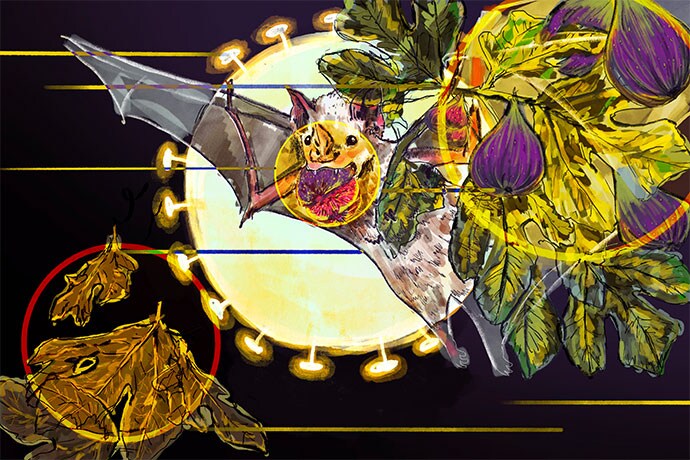
More than four dozen Jamaican fruit bats destined for a lab in Bozeman, Montana, are set to become part of an experiment with an ambitious goal: predicting the next global pandemic.
Bats worldwide are primary vectors for virus transmission from animals to humans. Those viruses often are harmless to bats but can be deadly to humans. Horseshoe bats in China, for example, are cited as a likely cause of the covid-19 outbreak. And researchers believe pressure put on bats by climate change and encroachment from human development have increased the frequency of viruses jumping from bats to people, causing what are known as zoonotic diseases.
"Spillover events are the result of a cascade of stressors — bat habitat is cleared, climate becomes more extreme, bats move into human areas to find food," said Raina Plowright, a disease ecologist and co-author of a recent paper in the journal Nature and another in Ecology Letters on the role of ecological changes in disease.
That's why Montana State University immunologist Agnieszka Rynda-Apple plans to bring the Jamaican fruit bats to Bozeman this winter to start a breeding colony and accelerate her lab's work as part of a team of 70 researchers in seven countries. The group, called BatOneHealth — founded by Plowright — hopes to find ways to predict where the next deadly virus might make the leap from bats to people.
"We're collaborating on the question of why bats are such a fantastic vector," said Rynda-Apple. "We're trying to understand what is it about their immune systems that makes them retain the virus, and what is the situation in which they shed the virus."
To study the role of nutritional stress, researchers create different diets for them, she said, "and infect them with the influenza virus and then study how much virus they are shedding, the length of the viral shedding, and their antiviral response."
While she and her colleagues have already been doing these kinds of experiments, breeding bats will allow them to expand the research.
It's a painstaking effort to thoroughly understand how environmental change contributes to nutritional stress and to better predict spillover. "If we can really understand all the pieces of the puzzle, that gives us tools to go back in and think about eco-counter measures that we can put in place that will break the cycle of spillovers," said Andrew Hoegh, an assistant professor of statistics at MSU who is creating models for possible spillover scenarios.
The small team of researchers at MSU works with a researcher at the National Institutes of Health's Rocky Mountain Laboratories in Hamilton, Montana.
The recent papers published in Nature and Ecology Letters focus on the Hendra virus in Australia, which is where Plowright was born. Hendra is a respiratory virus that causes flu-like symptoms and spreads from bats to horses, and then can be passed on to people who treat the horses. It is deadly, with a mortality rate of 75% in horses . Of the seven people known to have been infected, four died.
The question that propelled Plowright's work is why Hendra began to show up in horses and people in the 1990s, even though bats have likely hosted the virus for eons. The research demonstrates that the reason is environmental change.
Plowright began her bat research in 2006. In samples taken from Australian bats called flying foxes, she and her colleagues rarely detected the virus. After Tropical Cyclone Larry off the coast of the Northern Territory wiped out the bats' food source in 2005-06, hundreds of thousands of the animals simply disappeared. However, they found one small population of weak and starving bats loaded with the Hendra virus. That led Plowright to focus on nutritional stress as a key player in spillover.
She and her collaborators scoured 25 years of data on habitat loss, spillover, and climate and discovered a link between the loss of food sources caused by environmental change and high viral loads in food-stressed bats.
In the year after an El Niño climate pattern, with its high temperatures — occurring every few years — many eucalyptus trees don't produce the flowers with nectar the bats need. And human encroachment on other habitats, from farms to urban development, has eliminated alternative food sources. And so the bats tend to move into urban areas with substandard fig, mango, and other trees, and, stressed, shed virus. When the bats excrete urine and feces, horses inhale it while sniffing the ground.
The researchers hope their work with Hendra-infected bats will illustrate a universal principle: how the destruction and alteration of nature can increase the likelihood that deadly pathogens will spill over from wild animals to humans.
The three most likely sources of spillover are bats, mammals, and arthropods, especially ticks. Some 60% of emerging infectious diseases that infect humans come from animals, and about two-thirds of those come from wild animals.
The idea that deforestation and human encroachment into wild land fuels pandemics is not new. For example, experts believe that HIV, which causes AIDS, first infected humans when people ate chimpanzees in central Africa. A Malaysian outbreak in late 1998 and early 1999 of the bat-borne Nipah virus spread from bats to pigs. The pigs amplified it, and it spread to humans, infecting 276 people and killing 106 in that outbreak. Now emerging is the connection to stress brought on by environmental changes.
One critical piece of this complex puzzle is bat immune systems. The Jamaican fruit bats kept at MSU will help researchers learn more about the effects of nutritional stress on their viral load.
Vincent Munster, chief of the virus ecology unit of Rocky Mountain Laboratories and a member of BatOneHealth, is also looking at different species of bats to better understand the ecology of spillover. "There are 1,400 different bat species and there are very significant differences between bats who harbor coronaviruses and bats who harbor Ebola virus," said Munster. "And bats who live with hundreds of thousands together versus bats who are relatively solitary."
Meanwhile, Plowright's husband, Gary Tabor, is president of the Center for Large Landscape Conservation, a nonprofit that applies ecology of disease research to protect wildlife habitat — in part, to assure that wildlife is adequately nourished and to guard against virus spillover.
"Habitat fragmentation is a planetary health issue that is not being sufficiently addressed, given the world continues to experience unprecedented levels of land clearing," said Tabor.
As the ability to predict outbreaks improves, other strategies become possible. Models that can predict where the Hendra virus could spill over could lead to vaccination for horses in those areas.
Another possible solution is the set of "eco-counter measures" Hoegh referred to — such as large-scale planting of flowering eucalyptus trees so flying foxes won't be forced to seek nectar in developed areas.
"Right now, the world is focused on how we can stop the next pandemic," said Plowright. "Unfortunately, preserving or restoring nature is rarely part of the discussion."
Credits:
Images: OONA TEMPEST / KHN
KFF Health News © 2023








